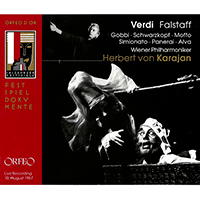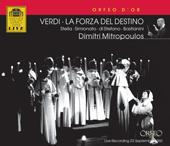Giulietta Simionato
Simionato, whose father was a prison governor, spent her early childhood in Sardinia. When she was eight her family moved to Rovigo, near Venice, where she commenced formal vocal studies with Ettore Locatello, a local bandmaster who helped her to understand her naturally-placed voice, and later with Guido Palumbo in Milan. Simionato was still a student when in 1927 she made her stage debut at the Teatro Sociale, Rovigo in Rossato’s Nina, non far la stupida. Her professional debut came the following year as Maddalena / Rigoletto and she also sang Lola / Cavalleria rusticana at Montagnana (some sources give the date of these appearances as 1932).
In 1933 Simionato attracted attention as the winner (out of 385 contestants) in a singing competition in Florence; the judges included Tullio Serafin and the veteran soprano Rosina Storchio, the first Madama Butterfly, who told her: ‘Always sing like this, dear one.’ Two years later she appeared at the Maggio Musicale, Florence, in the premiere of Pizzetti’s opera Orsèolo.
From 1936 onwards Simionato sang a succession of smaller parts at La Scala, Milan, commencing as a Flower Maiden in Parsifal and followed by La Cieca / La Gioconda, Suzuki / Madama Butterfly, Maddalena, Meg Page / Falstaff, Beppe / L’amico Fritz (with the composer Mascagni conducting, 1941), Hänsel / Hänsel und Gretel (1942) and Cherubino / Le nozze di Figaro (1944). Anxious to tackle more substantial roles she persuaded the management of La Scala to permit her to appear in Switzerland, where she sang Dorabella / Così fan tutte at Geneva in 1945 with success, followed by Ulrica / Un ballo in maschera in 1946.
In that year she repeated her Dorabella in Paris and in 1947 appeared as Cherubino with the Glyndebourne Festival Opera at the first Edinburgh Festival. She identified strongly with the title role, a put-upon street-singer, in Thomas’s Mignon, which she first sang in 1947 in Genoa and subsequently at La Scala to acclaim, as well as in Venice (1948) and Mexico (1949).
As the post-war bel canto revival gathered momentum, from the late 1940s onwards Simionato began to sing roles in operas by Bellini, Donizetti and Rossini; these included Leonora / La favorita, Romeo / I Capuleti e i Montecchi and Adalgisa / Norma, which she first sang in Mexico in 1950 opposite Maria Callas, a close friend. By now Simionato was recognized as the leading mezzo at La Scala, where she took many major roles including Rubria in Boito’s Nerone with Toscanini conducting (1948), Charlotte / Werther (1950), Angelina / La Cenerentola (1954), Isabella / L’ italiana in Algeri (1955) and Giovanna / Anna Bolena (1957) as well as Rosina / Il barbiere di Siviglia, the Princesse de Bouillon / Adriana Lecouvreur and Fidalma / Il matrimonio segreto at the opening of the Piccola Scala in 1955. Later at La Scala she took part in two important local premieres: Berlioz’s Les Troyens, in which she sang Dido (1960), and Falla’s Atlántida, as Queen Pirene; and sang Valentine in the company’s historic revival of Meyerbeer’s Gli Ugonotti (Les Huguenots) (both 1962).
1953 was a significant year for Simionato: she made debuts firstly at the Royal Opera House, London substituting for Fedora Barbieri as Amneris / Aida opposite Callas with Barbirolli conducting, and secondly in America as Charlotte with the San Francisco Opera. The following year she sang for the first time with the Chicago Lyric Opera where over six seasons her roles included Cherubino, Azucena / Il trovatore and the title role in Carmen. She enjoyed a strong musical rapport with Herbert von Karajan, appearing for the first time at the Salzburg Festival in 1957 as Mistress Quickly / Falstaff, followed by Eboli / Don Carlo (1958), Orpheus / Orfeo ed Eurydice (1959) and Azucena (1962–1963), as well as several performances of Verdi’s Requiem.
At the Metropolitan Opera Simionato’s debut came in the autumn of 1959 as Azucena, quickly followed by Santuzza / Cavalleria rusticana and later Amneris, which she repeated the following season, 1960–1961. She added Rosina to her New York repertoire in the autumn of 1962 and then Dalila / Samson et Dalila (her final role at the Met) in the spring of 1965. She retired from the operatic stage in 1966, still in fine voice, making her final appearance as Servilia / La clemenza di Tito at the Piccola Scala.
A singer of extraordinary versatility, Simionato was equally at home in lyric Mozartian roles, in bel canto operas, the heavier dramatic parts of Verdi and finally the verismo repertoire of Bizet, Giordano and Mascagni. Despite her small stature she commanded the stage in comic and dramatic roles, displaying both physical grace and vocal ease. Of her Azucena at the Met in 1959, the critic of The New Yorker tellingly wrote: …her vocal contribution was so flawless, so easy in production, and so mature in its skill as to make her role the center around which the evening revolved.’
© Naxos Rights International Ltd. — David Patmore (A–Z of Singers, Naxos 8.558097-100).


















